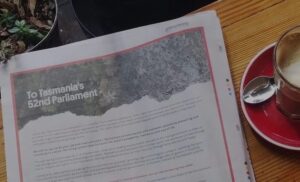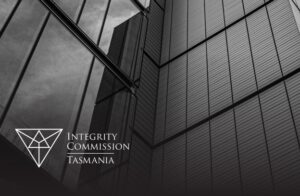The Macquarie Point stadium proposal is controversial. It’s also painfully expensive.
Whether you’re for or against the stadium, it looms as a huge strain on a Tasmanian budget which is already deep in the red.
But the cost of the stadium is small when compared to the amount of money Tasmanians have been missing out on due to shrinking GST revenue.
The GST was set up as the states’ own revenue source … a source which would grow with the economy.
It was pitched as a way of helping to solve states’ financial problems.
But the GST hasn’t been the growth tax that Australia’s states and territories were promised.
Recently released Australia Institute research shows that if the GST had kept up with growth in the economy, it would have collected an extra $22bn last year.
Tasmania’s share of that would have been $877m.
Let’s put $877m into context. The most recent estimate for the cost of the proposed stadium is almost $1bn, with the Tasmanian government picking up the tab for the lion’s share of that – $675m, which would include about $300m of borrowing.
So, an extra $877m wouldn’t just pay for a stadium; it would pay for a stadium every year.
Of course, Tasmanians might not want all that money spent on a stadium. There are plenty of other areas in desperate need of funding, like hospitals, schools, roads, and public housing, to name a few. The cost of all of these has also raced ahead of the growth in GST revenue.
So, why hasn’t the GST kept up with the rest of the economy?
It comes down to growing inequality. The share of total income in Australia that goes to wages has been falling, while the share going to profits has been increasing.
People who earn wages spend more of that income. As that share has fallen, so has the share going to GST.
We are also spending more on things that are exempt from the GST. As housing has become less affordable, Australians are spending a bigger share of their hard-earned on rent and mortgage repayments. Neither of these are subject to GST.
Australians are also spending more on healthcare and education, which are also exempt from the GST.
The result is a growing gap between what the GST can raise and the costs of the services that we demand from the state and territory governments that rely on GST revenue.
That gap is being bridged by cost-cutting and bigger budget deficits.
The result of cost-cutting has been longer hospital waiting times, less public housing, worse student outcomes and less money for roads and bridges.
Since the introduction of the GST 25 years ago, state and territory budgets have slowly slipped into the red.
Today, the only state in surplus is Western Australia, thanks to a huge resource boom and a sweet GST top-up payment from the feds.
One way to fix this would be to increase or broaden the GST. But the GST is a regressive tax, which means poorer people pay a larger proportion than the rich.
Another solution could be to add new federal government taxes to supplement the GST.
All the GST revenue is divided up and handed to the states, but it doesn’t have to be the only tax treated this way.
The federal government could add new taxes to this pool, which could increase the money going to the states to offset their shrinking share of GST.
It could:
- Impose a new excise on gas exports.
- Introduce a wealth tax for people worth more than $100m.
- Reform the capital gains tax discount and negative gearing, which would not only raise billions but also help make housing more affordable.
Australia is in desperate need of tax reform. At the same time, the states are struggling to find revenue to fund the high-quality services that taxpayers are demanding.
This is a great opportunity to solve both problems.
It’s right to have a democratic debate about whether the government should spend hundreds of millions of public dollars on a stadium.
But Tasmanians are being short-changed in lots of different areas because of the decline in GST revenue.
Fixing this should be a top priority for whoever forms government.
Between the Lines Newsletter
The biggest stories and the best analysis from the team at the Australia Institute, delivered to your inbox every fortnight.
You might also like
Whether for or against the stadium, Tasmanians overwhelmingly feel dudded by the AFL – poll
Regardless of who wins the July 19 state election, Tasmanians overwhelmingly want the government to rip up the dud stadium deal with the AFL.
Open Letter to the Tasmanian Government
The Australia Institute and 30 other organisations from around Tasmania have published an open letter with 10 asks for the environment from whomever forms Tasmania’s next government. When cross-benchers and major parties have struck successful power-sharing agreements elsewhere, they covered policy as well as procedure, making now the ideal time for progress.
Underfunded, toothless and lacking transparency – time for a new era of integrity in Tasmania
As Tasmania’s newly elected politicians jostle to form government, new analysis from The Australia Institute shows that a deal to address integrity would be popular among election-weary voters.




